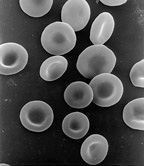
Photo from wikipedia
Background In recent years, emerging evidence has highlighted the role of vitamin D as an iron absorption enhancer by suppressing hepcidin concentration, albeit with an unclear underlying mechanism. Dietary-based approach… Click to show full abstract
Background In recent years, emerging evidence has highlighted the role of vitamin D as an iron absorption enhancer by suppressing hepcidin concentration, albeit with an unclear underlying mechanism. Dietary-based approach in improving iron status has been widely practised, however, there is a scarcity in randomized controlled trials (RCT) to elucidate the effect of vitamin D-fortified juice on iron status recovery. Therefore, this study aims to investigate the effect of an 8-week vitamin D3-fortified fruit juice supplementation on iron status indicators in childbearing-aged women with marginally low iron stores. Methods In a placebo-controlled, double-blind, RCT, a total of 120 women aged between 19–40 with serum ferritin < 20 μg/l and fulfilled the eligibility criteria will be randomized into consuming either vitamin D3-fortified fruit juices containing 4000 IU (100 mcg) (vitamin D) or placebo-fruit juices (placebo) daily for eight weeks. At every 4-week interval, 10 ml fasting blood sample, information on dietary habit and anthropometric measurement will be collected. A mixed model repeated-measures analysis of variance will be performed to determine the effect of the intervention and the interaction with time points for all iron and vitamin D status blood biomarkers. Discussion Vitamin D supplementation in food fortification as a novel iron absorption enhancer might be a future and relevant alternative management of iron deficiency as opposed to the oral iron therapy that has poor adherence. Trial registration Clinicaltrials.gov: registration number NCT04618289, registration date October 28, 2020, protocol ID JKEUPM-2020-033.
Journal Title: PLoS ONE
Year Published: 2022
Link to full text (if available)
Share on Social Media: Sign Up to like & get
recommendations!